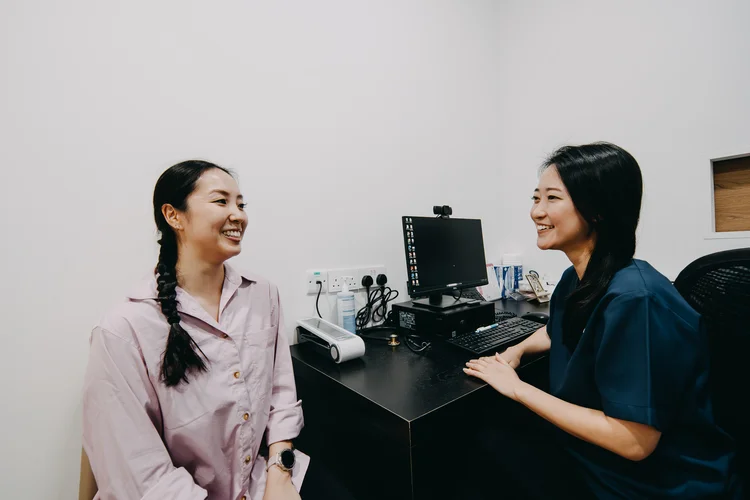Syphilis Testing & Treatment
| Test Options |
|
| Treatment | Antibiotics injection |
| Price |
|
| Appointment Options |
Same-day appointment (subject to availability). Book via WhatsApp: 8893 3757 or email: hello@healthscreening.sg |
| Clinic Locations |
Orchard: 1 Orchard Blvd
#05-09 Camden Medical Centre, S248649 Tanjong Pagar: 72 Anson Rd #01-02 Anson House, S079911 |
What Is Syphilis?
Syphilis is a sexually transmitted infection caused by the bacterium Treponema pallidum. Without timely treatment, syphilis
can progress through various stages, leading to severe health complications.
According to a 2018 study, syphilis ranks among the top three
sexually transmitted infections in Singapore.

Syphilis Symptoms
The symptoms of syphilis differ depending on the stage of the infection. Here are some common signs that may appear in both men and women:
Primary Stage
Chancre sores: Small, firm, painless sores appear at the site of infection, such as the genitals, rectum, or mouth. These sores typically heal on their own within 3 to 6 weeks but indicate the beginning of the infection.
Secondary Stage
- Skin rashes: Rough, reddish-brown rashes often develop on the palms of the hands, soles of the feet, or other parts of the body. These rashes are usually not itchy.
- Mucous membrane lesions: Moist, raised patches may occur in the mouth, throat, or genital areas.
- Other possible symptoms: Fever, swollen lymph nodes, muscle aches, fatigue, and patchy hair loss. These symptoms may resolve even without treatment, but the infection persists in the body.

Latent Stage
In the latent stage, the infection lies dormant without any visible symptoms. However, the bacterium remains active in the body and can progress to more severe stages if untreated. This stage can last for years.
Late Stage (Tertiary Stage)
This stage can occur years or even decades after the initial infection if untreated. Symptoms are severe and may include:
- Damage to the brain, nerves, eyes, heart, or other organs.
- Neurological issues such as memory loss or difficulty coordinating movements.
- Cardiovascular complications, including damage to blood vessels.
Complications of Syphilis
If left untreated, syphilis can progress to later stages, causing serious health issues such as neurological damage, cardiovascular complications, and even organ failure. Early detection and treatment are crucial to prevent these outcomes.
How Long Before Symptoms of Syphilis Appear?
Symptoms typically develop 10 days to 3 months after exposure, with the average incubation period being around 21 days.
How to Test for Syphilis?
Syphilis testing typically involves a blood test to detect antibodies produced in response to the infection, along with a physical examination if sores or lesions are present. At healthscreening.sg, we provide quick and confidential testing services to safeguard your sexual health.
These tests can determine whether a person has been exposed to HSV-1 or HSV-2.
Is Syphilis Curable?
Yes, syphilis can be completely cured with appropriate antibiotic treatment, particularly when diagnosed and treated in its early stages. However, while early treatment prevents complications, it may not be able to reverse damage caused by late-stage syphilis.
Syphilis Treatment
Syphilis is effectively treated with antibiotics, most commonly penicillin. The specific treatment plan depends on the stage of the infection:
- Primary or Secondary Stage Syphilis: A single intramuscular injection of penicillin G benzathine is usually sufficient to cure the infection.
- Late-Stage or Latent Syphilis: Three intramuscular doses of penicillin G benzathine are given at weekly intervals.
- Neurosyphilis: Intravenous penicillin is required for 10–14 days to target the infection in the nervous system.
For those allergic to penicillin, alternative antibiotics such as doxycycline or azithromycin may be prescribed. It’s essential to complete the full course of treatment and avoid sexual activity until your doctor confirms the infection has cleared. After treatment, follow-up blood tests are necessary to ensure the infection has been completely eradicated.
How Long to Cure Syphilis With Treatment?
The time required to cure syphilis varies depending on the stage of the infection. Early-stage syphilis can typically be resolved with a single dose of antibiotics. Later stages, including latent or neurosyphilis, may require an extended treatment plan lasting several weeks.
Syphilis Test & Treatment Cost
At healthscreening.sg, we provide testing and treatment for syphilis, with the prices as follows:
| Test/Treatment | Price* |
|---|---|
| Consultation | $49.05 |
| Syphilis TP Antibody Test | $21.80 |
| Penicillin G Injection (1 Dose) | $81.75 |
| Penicillin G Injection (3 Doses) | $212.55 |
*Prices are NETT and inclusive of GST.
^Prices last updated on
Jan 28, 2026. While every effort is made to keep pricing information up to date, please contact our team to confirm the latest rates.
How Do I Make an Appointment?
STD Test in Singapore
Regular STD screening is a crucial part of maintaining your overall health, particularly for sexually active individuals, including those with multiple partners. Early detection of sexually transmitted diseases can prevent serious health complications and ensure timely treatment. At healthscreening.sg, we offer comprehensive STD testing to help you take charge of your sexual health and safeguard your future well-being.
Why Choose Us?








Navigate Easy With Google Maps
Health Screening Singapore (Anson House)
Nearest MRT: EW15 Tanjong PagarHealth Screening Singapore (Camden Medical Centre)
Nearest MRT: TE13 Orchard BoulevardHealth Screening Singapore (CPF Jurong Building)
Nearest MRT: NS1/EW24 Jurong EastFrequently Asked Questions (FAQ)
Syphilis is diagnosed through a blood test to detect antibodies and, if necessary, a physical examination of sores or lesions. Treatment involves antibiotics, usually a single dose of penicillin for early stages or multiple doses for advanced stages.
Syphilis is typically diagnosed through a blood test to detect antibodies and may also involve a physical examination of any sores or lesions.
Syphilis testing is available at most GP clinics and involves a simple blood draw, with results typically ready in a few days. At healthscreening.sg, we provide syphilis testing for $21.40 NETT (inclusive of GST) and offer antibiotic treatment if needed.
Yes, syphilis can be completely cured at any stage with appropriate antibiotic treatment, most commonly penicillin. However, while the infection can be eradicated, damage caused by late-stage syphilis, such as neurological or cardiovascular complications, may be permanent and cannot be reversed.
Yes, with prompt and appropriate treatment, individuals can fully recover and live a normal life. Early treatment prevents complications, avoids irreversible damage, and eliminates the risk of transmitting the infection.
If you test positive for syphilis, your doctor will prescribe the appropriate treatment. It’s important to inform any recent sexual partners so they can also get tested and treated. Avoid sexual activity until your doctor confirms you are no longer infectious.
There is no reliable way to self-diagnose syphilis, as symptoms like sores or rashes may not always be noticeable. The only way to know for sure is through a blood test. If you suspect exposure, consult a doctor for testing.
Without treatment, syphilis progresses in stages over months or years. The early stages can resolve temporarily without treatment, but the infection remains in the body and can lead to serious complications in later stages.
A positive VDRL (Venereal Disease Research Laboratory) test indicates the presence of antibodies to syphilis, suggesting an active or past infection. A confirmatory test, such as TPPA (Treponema Pallidum Particle Agglutination), is often needed for a definitive diagnosis.
Yes, general practitioners (GPs) can conduct syphilis blood tests and provide treatment. At healthscreening.sg, syphilis testing is available for $21.40 NETT, inclusive of GST. If required, antibiotic treatment can also be provided.
Syphilis testing is generally affordable. At healthscreening.sg, the test costs $21.40 NETT, inclusive of GST. Antibiotic treatment is also available if needed.
Symptoms of syphilis vary depending on the stage. In the primary stage, painless sores may appear, while the secondary stage often involves rashes and flu-like symptoms. The latent and tertiary stages may have no visible symptoms until severe complications develop. Testing is the only definitive way to confirm syphilis, so it is important to consult a doctor if you suspect exposure.
Syphilis itself is not typically itchy. However, secondary stage rashes may cause mild discomfort, although they are usually painless and not itchy.
